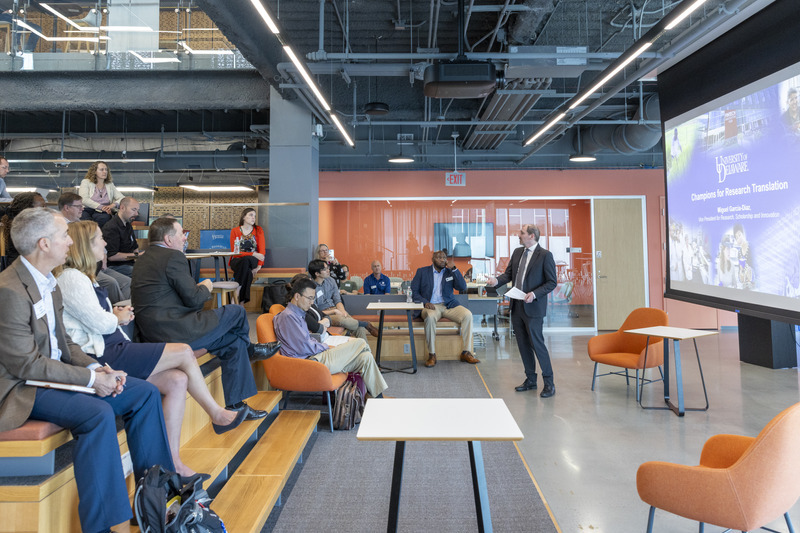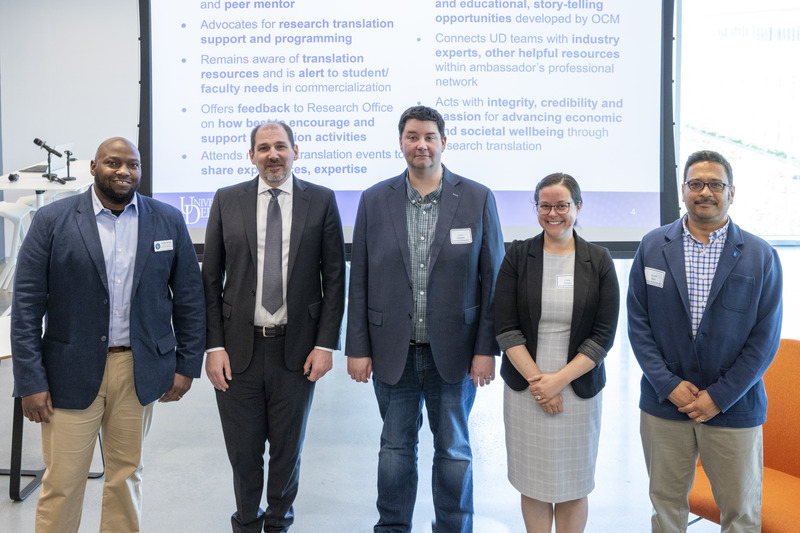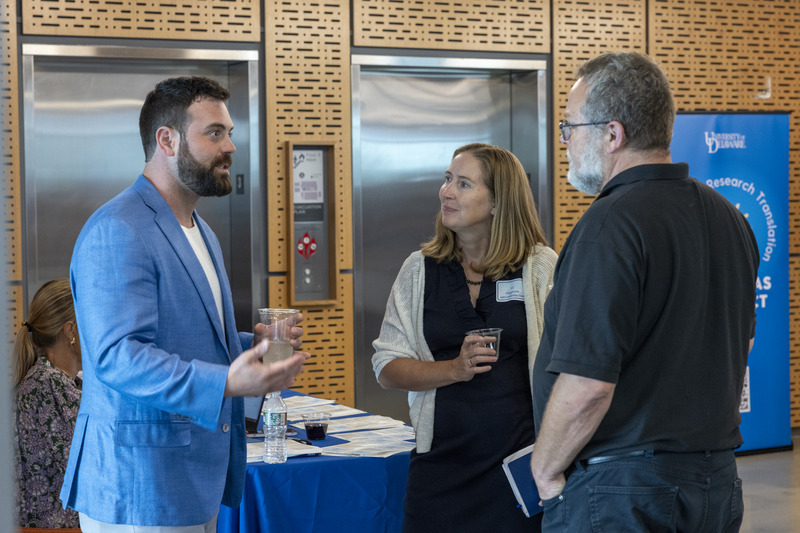


Moving innovation to impact
Photos by Maria Errico and Evan Krape June 23, 2025
Campus innovation community shares lessons for translating discoveries to market
Academic research labs are engines of discovery — powering advances in fields like biopharmaceuticals, satellite navigation and the touch-screen technology. (That last one? It grew out of electrical and computer engineering graduate research right here at the University of Delaware.)
But hatching a good idea is a far cry from seeing a product on store shelves or a novel material used in a life-saving medicine. Getting from the lab bench to the marketplace — where innovations can truly make a difference — is a formidable challenge.
That’s why the University of Delaware is diligently working to enhance infrastructure and support available to campus innovators. As part of this effort, the U.S. National Science Foundation Accelerating Research Translation (NSF ART) program at UD recently brought together over 100 industry and campus experts, including UD faculty, staff and students representing 29 departments, for a day of knowledge-sharing focused on turning research into real-world solutions.
The NSF ART program is investing in capacity-building resources that enhance research translation. UD is one of the inaugural awardees of the NSF ART program. The NSF ART program at UD is led by Jill Higginson, George W. Laird Professor of Mechanical Engineering in UD’s College of Engineering and director of UD’s Institute of Engineering Driven Health (IEDH).
Jake Becraft, CEO and co-founder of Strand Therapeutics, delivered the event’s keynote address. His company is developing safer, more effective messenger RNA (mRNA) therapies, but his path from academic research to startup leader wasn’t always smooth. Lifting research out of academic labs and into the community where it can help people is arduous, and the failure rate is high. But this doesn’t mean you shouldn’t do it. In fact, Becraft thinks you should.
“The person who is most invested in seeing whatever you’re working on at the bench move into the world … is you,” he said.
To would-be innovators wondering how to get started, Becraft offered a simple message: “Just go do.”
In other words: get out there and be a company. Take advantage of training opportunities that put you in front of people who can pressure-test your ideas and inventions. Seek guidance from peers. Make mistakes, make pitches. Most importantly, just get started.

UD resources for translating innovation
Dan Freeman, founding director of UD’s Horn Entrepreneurship program, explained that innovations can be translated to society in many ways. It isn’t always about starting a company. Maybe it’s the distillation of best practices that others can adopt, such as those provided to the biomedical training community through The Perry Initiative, co-founded by UD mechanical engineer Jenny Buckley. The Perry Initiative started as a grassroots effort to provide extracurricular outreach to students in high school and medical school. Today, it is a full-fledged nonprofit organization that runs over 50 programs and has reached over 18,000 students through its events.
For others, licensing or spinning out a startup may be the right path. Matthew Mauriello, assistant professor of computer and information sciences, and Daniel Stevens, professor of music theory in the School of Music, collaborated to develop a listening device that allows older adults and children with autism to become their own composers, trying out different musical combinations that suit their listening needs and preferences. The device is currently installed in the Sensory Room at the Route 9 Library and Innovation Center in New Castle, Delaware, and Mauriello and Stevens have patented their work. They hope to license it to a company.
Bridging this gap between discovery and practical application isn’t easy. That’s why UD is strengthening its innovation ecosystem to provide mentorship, guidance and connections that can help. The first stop for any UD innovator is the Office of Economic Innovation and Partnerships (OEIP), the unit responsible for managing intellectual property at the University. OEIP is led by Julius Korley, associate vice president, and includes the Technology Transfer Office and Small Business Development Center, which work to propel UD innovation forward across campus.
“The biggest mistake startups and inventors make is building something no one wants,” said Freeman. “The goal of the UD ecosystem, from ART to Horn Entrepreneurship to OEIP to Corporate Engagement, is to support you from when you have an idea to when you become interested in taking your idea to the marketplace.”
Programs available to campus innovators include the NSF I-Corps program, which helps inventors discover whether an idea has value outside of the laboratory; academic courses for student entrepreneurs to explore ideas and business concepts in a safe environment; and co-curricular programs such as Horn’s Blue Hen Innovation Fest, Summer Founders and InDE Fellows, which can help innovators prepare to launch companies. Meanwhile, Blue Hen Venture Acceleration Lab offers mentorship, training and financial support to inventors working to spin companies out of the University.
Corporate partnerships can fuel translation
A conversation between Nicole Merli, director of university and industry relations, and David Martin, Karl W. and Renate Böer Chaired Professor of Materials Science and Engineering, tackled a topic on many people’s minds — ways innovators can diversify their relationships and research funding beyond what is supported by the federal government.
Corporate partnerships, for example, can help accelerate innovation, provide new revenue streams and help translate innovations to the real world. Understanding what companies need and how your research or technology can help fill that gap is critical to forging successful partnerships, said Merli, who holds a joint role with UD and the Delaware Bioscience Association. Her position was enabled by the NSF ART program.

According to Merli, industry engages with research institutions to tap into talent pipelines, solve pressing challenges through collaboration, and access cutting-edge science and promising intellectual property. Just as crucially, companies seek opportunities to validate and de-risk emerging technologies before scaling them.
Martin described his work with industry collaborator Immerse Delaware, a Waters Innovation and Research Laboratory, located in UD’s Ammon Pinizzotto Biopharmaceutical Innovation Center. Martin’s research focuses on developing special sensors to measure antibodies and proteins in bioreactors. Bioreactors are large devices and systems used to scale up production and manufacturing of things like pharmaceuticals and other products in a controlled environment. Martin was interested in testing and derisking his sensor technology at a large enough scale to ensure it would work effectively. Situated on UD’s Science, Technology and Advanced Research (STAR) Campus, Immerse Delaware offered the analytical resources Martin needed, right on campus.
To begin building corporate engagement, Merli suggested researchers could invite a company to visit their lab, sponsor internships or senior design projects, or collaborate on a research project via shared equipment the way Martin had done.
“You don’t need a polished plan or a million-dollar idea to begin,” said Merli. “Start small – curate the opportunities to share what you’re working on and see where the conversation leads. Taking that first step with an open mind is often the most important.”
UD inventors named Innovation Ambassadors
To help grow UD’s innovation culture, Miguel Garcia-Diaz, UD’s vice president for research, scholarship and innovation, named three successful inventors to serve as inaugural Innovation Ambassadors on campus: Harsh Bais, Catherine Fromen and Jason Gleghorn.
These ambassadors will act as mentors, champions and connectors – sharing firsthand experience in moving discoveries from the lab to the world and advocating for institutional resources that support translation.
“These leaders and influencers will play a key role in advancing a vibrant culture of innovation at UD,” said Garcia-Diaz. Additional Innovation Ambassadors will be announced in the future.
Harsh Bais, professor of plant and soil sciences in the College of Agriculture and Natural Resources, and colleagues identified, optimized and commercialized a unique strain of natural, beneficial bacteria living in the soil and on plant roots, with funding from the National Science Foundation and other key partners. The microorganism, called “UD1022,” is licensed by the global company BASF and used across the U.S. and Canada in formulations to boost the protection of pea and lentil seedlings and plants from key soil-borne diseases, maximizing crop yield. This foundational work, done more than a decade ago with federal support, has led to other studies resulting in patented applications for improving moisture retention in plants, disarming fungal pathogens that affect turf grass, and even improving the ability to grow plants in space.
Catherine Fromen, Centennial Term Professor for Excellence in Research and Education and associate professor of chemical and biomolecular engineering and biomedical engineering, shared her team’s work applying engineering fundamentals and innovative tools with the latest understanding in immunology to better predict how physical and pathological changes in the body impact the effectiveness of inhaled therapeutics. It’s an important area of study with the ability to impact hard-to-treat respiratory diseases, from influenza and pneumonia to cystic fibrosis, allergy and lung cancers to asthma and COPD. Fromen holds several patents and has experience in developing industry partnerships.
Jason Gleghorn, associate professor of biomedical engineering, is developing cutting-edge computational and microfluidic tissue models with the potential to advance clinical solutions in women’s health, maternal-fetal health and pre-term birth. These microfluidic tissue models can help researchers better understand disease progression and drug transport in the female reproductive tract, placenta, lung and lymph node. Gleghorn has several patents and has started two spin-out companies.
Contact Us
Have a UDaily story idea?
Contact us at ocm@udel.edu
Members of the press
Contact us at mediarelations@udel.edu or visit the Media Relations website

